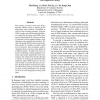Free Online Productivity Tools
i2Speak
i2Symbol
i2OCR
iTex2Img
iWeb2Print
iWeb2Shot
i2Type
iPdf2Split
iPdf2Merge
i2Bopomofo
i2Arabic
i2Style
i2Image
i2PDF
iLatex2Rtf
Sci2ools
124
click to vote
EMNLP
2008
2008
Word Sense Disambiguation Using OntoNotes: An Empirical Study
The accuracy of current word sense disambiguation (WSD) systems is affected by the fine-grained sense inventory of WordNet as well as a lack of training examples. Using the WSD examples provided through OntoNotes, we conduct the first large-scale WSD evaluation involving hundreds of word types and tens of thousands of sense-tagged examples, while adopting a coarse-grained sense inventory. We show that though WSD systems trained with a large number of examples can obtain a high level of accuracy, they nevertheless suffer a substantial drop in accuracy when applied to a different domain. To address this issue, we propose combining a domain adaptation technique using feature augmentation with active learning. Our results show that this approach is effective in reducing the annotation effort required to adapt a WSD system to a new domain. Finally, we propose that one can maximize the dual benefits of reducing the annotation effort while ensuring an increase in WSD accuracy, by only perfor...
EMNLP 2008 | Large-scale Wsd Evaluation | Natural Language Processing | Sense Inventory | WSD Systems |
Related Content
| Added | 29 Oct 2010 |
| Updated | 29 Oct 2010 |
| Type | Conference |
| Year | 2008 |
| Where | EMNLP |
| Authors | Zhi Zhong, Hwee Tou Ng, Yee Seng Chan |
Comments (0)

